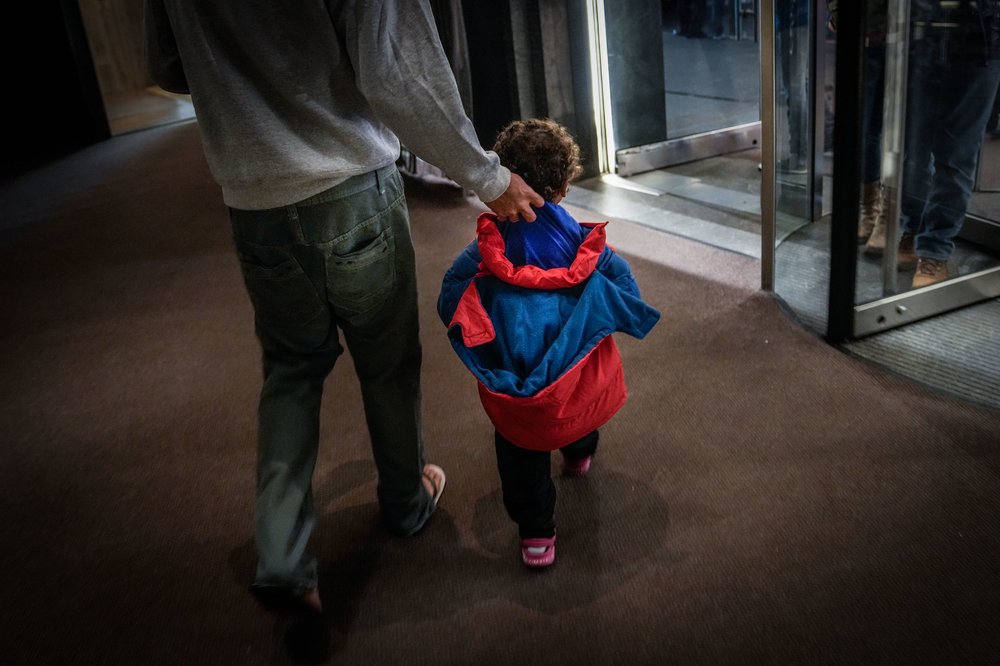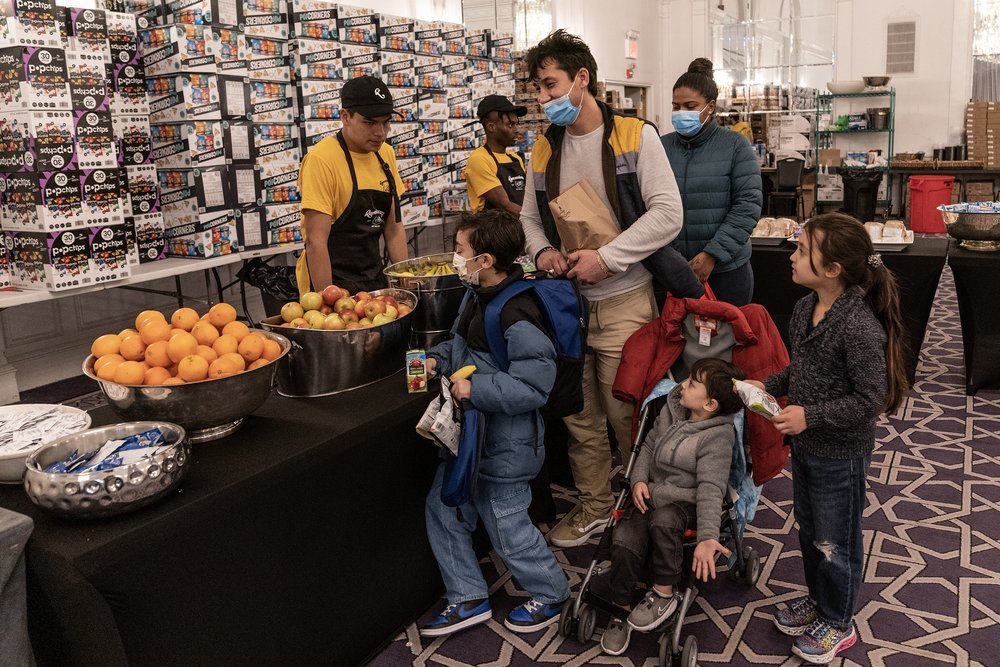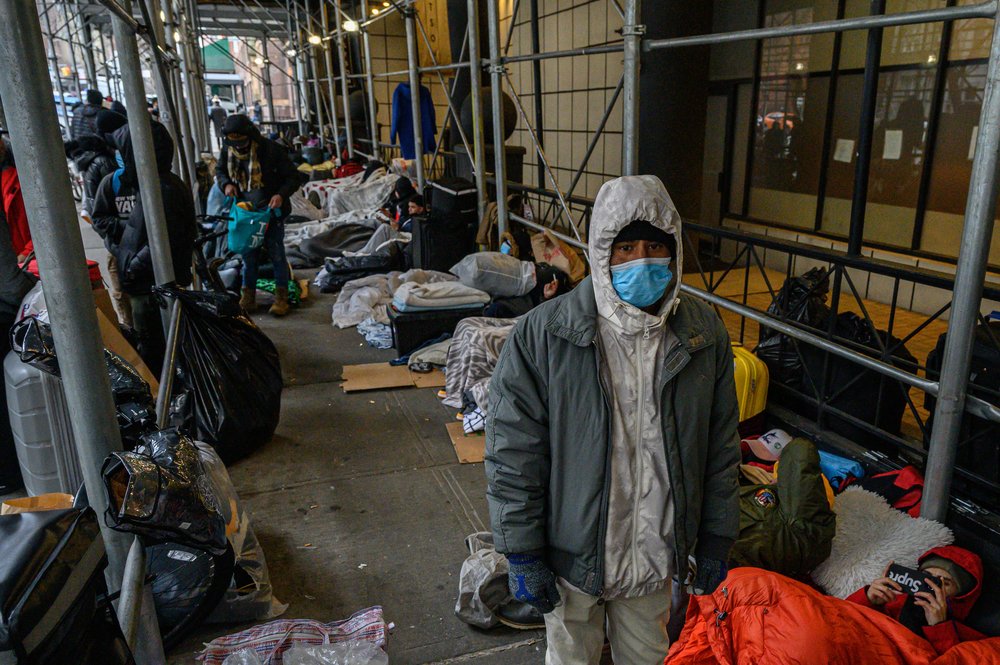Health workers in NYC describe confusion, errors in early days of asylum seeker vaccine clinics
March 28, 2023, 5:01 a.m.
Scant training and confusing guidelines led to mistakes, employees allege.

A medical company contracted by New York City to bring thousands of migrants up to date on vaccines struggled to train staff on how to choose doses and interpret international vaccine records in the early weeks of its operation, according to internal documents reviewed by Gothamist and interviews with current and former staff members.
Contemporaneous email exchanges and interviews with two nurses who worked on the project in early 2023 show that staff hired by Affiliated Physicians mixed up vaccines with similar names, misunderstood vaccine records and incorrectly counted oral polio doses. Workers say that mistakes and near-misses occurred during almost every shift they worked in January. And because Affiliated Physicians tracked each patient’s vaccines with disposable paper slips rather than an electronic medical record, workers said in interviews, it was difficult to trace those errors back to specific people.
Vaccines are an important part of health care for the more than 30,000 migrants living in city shelters as of March 7. Many families had fallen behind on medical care in their home countries or during their journeys, and the children needed certain shots on a precise schedule to stay enrolled in their new schools. Advocates and workers said that in recent months shelters have seen outbreaks of vaccine-preventable viruses like chickenpox, which can increase the risk of birth defects if contracted by a pregnant person.
Affiliated Physicians, which typically offers onsite shot clinics and health screenings for companies, has been heavily involved in past vaccine rollouts, including for COVID and mpox. But interviews with workers on the ground and internal correspondence about the asylum-seeker vaccine clinics point to limited training and unclear guidance that led to errors and hiccups.
“S--t was going wrong every single day,” said one former staff member, who asked not to be identified due to fears of retribution and because they want to keep working in health care.
These are incredibly complex patients. Some of the most complex that I see.
Dr. Gunisha Kaur, director, Weill Cornell Medicine's Human Rights Impact Lab
The workers interviewed by Gothamist said Affiliated Physicians has improved substantially since January, tweaking procedures in response to feedback from staff. Email bulletins shared with nurses include changes to record-keeping, constantly updated guidelines, and repeated urgings to go slow and avoid mistakes.
And Health + Hospitals, which is managing health care for the migrants, has invested huge resources in delivering these shots, including the Affiliated Physicians clinics. Since last year, the city has given out more than 15,000 vaccines to asylum-seekers, including 9,000 to children, according to data shared by NYC Health + Hospitals, the city's public hospital system.
Vaccines represent only one part of the health care provided to migrants. About 8,000 have been signed up for health insurance, and those staying in the city’s Humanitarian Emergency Response and Relief Centers, or HERRCs, also have access to other onsite medical services. Asylum-seekers themselves said they’re more than satisfied with the care they’ve received overall. Blanca Alarcón, who arrived in New York City in December, said her three children got vaccines both in Colombia and here in the U.S.
“They are really attentive to us,” she said. “It’s been really easy and fast.”
When asked for comment, Affiliated Physicians referred Gothamist to New York City Health + Hospitals, which has led the city’s asylum-seeker response. Health + Hospitals spokesperson Adam Shrier said the public hospital system has been working hard to care for migrants’ health since they first arrived.

“We are proud to have provided 15,000 vaccinations at HERRC facilities and the City’s Asylum-Seeker Resource Navigation Center — protecting our newest neighbors from life-threatening, vaccine-preventable diseases and allowing children to quickly enroll in public schools,” Shrier said in an email.
Because Mayor Eric Adams declared the arrival of asylum-seekers an emergency in August of last year, it’s difficult to track exactly how much the city is spending on the vaccination effort, according to a report released earlier this month by the City Council’s contracts and finance committees. An emergency declaration allowed the city to extend existing contracts instead of creating new procurements, making it harder to disentangle asylum-seeker-related expenses from other projects. A November report by the city’s Independent Budget Office estimated that basic health care would cost the municipal government about $1,500 for each asylum-seeker in the city’s care.
That price tag doesn’t include the specialized medical care that asylum-seekers and refugees may need, the report’s authors note. Migrants may arrive suffering from the effects of undernutrition, inconsistent access to doctors and the trauma of migration, said Dr. Rachel Moresky, director of the global emergency medicine fellowship at Columbia University’s Mailman School of Public Health.
Dr. Gunisha Kaur, director of the Human Rights Impact Lab at Weill Cornell Medicine, added that caring for asylum-seekers requires special expertise. “These are incredibly complex patients,” she said. “Some of the most complex that I see.”
That complexity extends to their vaccination needs. Children may come to shelter clinics with vaccination records in different languages, reflecting different vaccine formulations and schedules than are used in the U.S. — or may not have any vaccine records at all.
“They definitely need vaccines,” NYC Health + Hospitals’ Ted Long told the City Council’s contracts committee at a hearing on March 3. “It still astounds me as a primary care doctor that we're seeing less than half of the children from many of these countries have received lifesaving vaccines to date.”
‘A very learnable thing’
Last fall, as more migrants arrived in New York, City Hall initially contracted two other companies — DocGo and Somos Community Care — to provide health care services for them, including vaccinations, according to the City Council report. Affiliated Physicians started running vaccine clinics in January, according to emails reviewed by Gothamist, and recruited more than three dozen nurse practitioners to work the clinics on a per-diem basis.
It was an expansion of an existing business relationship. Affiliated Physicians has contracted with the city for more than a decade. But since the rollout of the first COVID-19 vaccines in December 2021, the company has raked in hundreds of millions of dollars from the health department and other agencies, according to data from the NYC Comptroller. Over the past eight months alone, the city has spent close to $74 million on COVID, mpox and other medical services administered by Affiliated Physicians.
But two medical staff members brought on this January for the new clinics said they only received a single training session before their first shift choosing and supervising the administration of vaccines — a brief meeting held over Zoom without much information about the unique complexity of international vaccine work. That was especially concerning for new nurse practitioners whose specialties, like surgery or adult primary care, didn’t involve much vaccination, said a current employee who asked to remain anonymous for fear of retribution.
“I’m working with someone who has never seen the catchup schedule or even ever been in a setting where they’ve been doing vaccines at all,” they said. “It’s a very learnable thing. But [Affiliated Physicians] didn’t even know the questions to ask to realize or appreciate the gravity of the assignment.”
On-shift guidelines were also at times confusing for staff, the workers said. A “cheat sheet” explaining the age ranges for different shots didn’t reflect NYC school requirements or the vaccine catch-up schedule for new arrivals, leading some nurses to think some patients were ineligible for vaccines they actually needed, they said. The sheet was corrected and re-distributed on Feb. 1, several days after staff flagged the confusing age ranges, emails show.
General shift responsibilities were also unclear during onboarding, according to an exchange on an informal late-January WhatsApp group chat provided to Gothamist. In it, a nurse practitioner asked whether there were stethoscopes onsite or should she bring her own to her first shift at an Affiliated Physicians vaccine clinic.
Physical exams weren’t part of the work they were doing, explained nursing and clinical services director Anne Revman, although they’d have stethoscopes on hand just in case.
“We are not examining?” the nurse wrote back. “Can you explain our responsibilities to me please as I have not had a shift yet.”
“I’ll get you details tomorrow,” Revman replied.
Dose slips and slip-ups
Worker interviews and internal emails show that the confusion translated into mistakes. Both past and current AP employees said undertrained staff mixed up vaccines with similar names when choosing shots and uploading vaccine records into the city’s Central Immunization Registry. For example, they swapped DTaP and Tdap, the respective names for the child and adult combined vaccine for diphtheria, tetanus and pertussis, multiple times. They also had trouble distinguishing between the Hepatitis B vaccine and the Hib vaccine, which staves off a bacterial infection called Haemophilus influenza type B.
Revman cautioned staff to avoid mixing up vaccine names in a late-January email message, but did not mention explicitly that errors had been made.
“Do not confuse Hib with Hep B,” she wrote. “Slow down and verify everything before administering.”
Nurses on staff also struggled to understand the international vaccine formulations on patients’ records, according to the emails and interviews. For example, workers expressed that undertrained staff marked some children as being fully vaccinated against polio if they’d received oral vaccines, which are used outside the U.S. In fact, the oral doses don’t count if they were administered anytime after April 1, 2016.

Staff also misunderstood the 5-in-1 “pentavalent” vaccine, which is commonly used in low-income countries, workers said. The shot includes immunizations against diphtheria, tetanus, pertussis (whooping cough), Hib and Hepatitis B — but undertrained staff sometimes marked patients who’d received the combo vaccine as needing one or more of its components, according to interviews and contemporaneous emails. Mistakes of one kind or another were happening “a couple times a day,” said the current employee.
An extra dose of vaccine isn’t going to cause harm, said Donna Hallas, a pediatric nurse practitioner and clinical professor at NYU’s Rory Meyers College of Nursing.
“In the vaccine world, it’s safer to give it again than to not give it and get the disease,” she said.
But the current employee noted that the errors can add up over time — particularly if they lead to kids missing vaccines they need.
An extra vaccine here and there is not going to kill them. But the cumulative effect of mistakes in the process – those things surely have an effect.
Nurse working with Affiliated Physicians
“These things do matter,” they said. “An extra vaccine here and there is not going to kill them. But the cumulative effect of mistakes in the process – those things surely have an effect.”
Employees also allege that the mistakes were hard to trace because of Affiliated Physicians’ recordkeeping practices. Rather than using an electronic health record that included the patients' and nurses’ names, they said, the company opted for paper slips with the list of vaccines recommended for each patient. Early versions of the slips, which were reviewed by Gothamist, didn’t include spaces for patients’ or nurses’ names. Later editions of the slips included this information, but workers flagged that since the papers are thrown out after the vaccines have been administered, it’s impossible to track which nurse chose and administered vaccines for which patient.
“In a usual system, there could always be chart reviews where you go back through your charts and say, ‘Are we doing the right thing here?’” the current employee said. “But because there was no paper trail, no electronic trail, there’s no integrity in the system.”
A well-oiled machine
Workers said Affiliated Physicians tightened up its operations in February and March, and internal correspondence supports that assertion. Staff received weekly emails detailing changes to the vaccination procedures — adding double-checks and correcting mistakes. One jam-packed dispatch in early February included updated dose slips, a corrected cheat sheet and the reminder, “Don’t rush.” Another, from March 1, instructed staff not to count oral polio doses administered starting in April 2016.
The current employee praised the company for its focus on safety and its improvement over time.
“When it comes to the actual physical handling of vaccines, drawing up and getting it to the patient — that part is a pretty well-oiled machine,” they said. “It’s not like they’re just completely allergic to change; the speed of the rollout and the magnitude of it didn’t allow for checks and balances.”
Asylum-seekers who have used the city’s vaccine clinics agree that the process was smooth and easy. In particular, they commended the availability of translators at the vaccination stations.
Juana Landazuri said her 3-year-old and 16-year-old got vaccinated at a HERRC clinic a couple of months after their arrival. The process was “easy because of the translators,” she said.
In a report on asylum-seekers released in early March, the city called on the federal government to administer varicella and MMR (measles, mumps and rubella) vaccines at the border, and on the state to extend vaccination privileges to pharmacists. The report’s authors also issued a plea for additional federal funding for community health centers, which they say could run out of money by this fall.
Caroline Lewis contributed reporting.